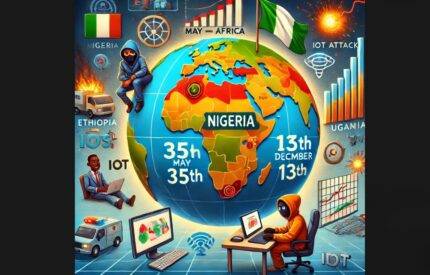Between May and December 2024, Nigeria witnessed a dramatic escalation in cyberattacks, catapulting from the 35th to the 13th position on Check Point Software Technologies’ Global Threat Index. This shift underscores the growing vulnerability of the nation’s digital infrastructure, as cybercriminals increasingly exploit systemic weaknesses. The surge in attacks highlights the urgent need for comprehensive cybersecurity measures to protect critical sectors.
The steep climb in the rankings reflects a troubling trend not only for Nigeria but also for Africa as a whole. With digital adoption expanding rapidly across the continent, hackers are targeting the region’s emerging economies to exploit gaps in security. Nigeria’s prominent position in Africa as an economic powerhouse makes it an attractive target for cybercriminals seeking to disrupt essential services and infrastructure.
Nigeria: Africa’s Broader Cybersecurity Crisis
Nigeria’s situation mirrors a wider crisis gripping the African continent, with several nations climbing the Global Threat Index. Ethiopia topped the list globally, recording a staggering 98.2% Normalized Risk Index in December 2024. Uganda, Angola, Ghana, Kenya, Mozambique, and Côte d’Ivoire also featured prominently among the 20 most attacked countries worldwide.
Uganda ranked 8th with a 68.2% Normalized Risk Index, closely followed by Angola in 9th place at 66.2%. Ghana, Kenya, Mozambique, and Côte d’Ivoire ranked 11th, 17th, 18th, and 20th respectively, underscoring the continent’s heightened exposure to cyber threats. The prevalence of attacks across Africa emphasizes the need for a coordinated regional response to address shared vulnerabilities and bolster defenses.
Androxgh0st Malware and Its Impact
A key driver behind the surge in cyberattacks is the Androxgh0st malware, which has become increasingly potent through its integration with the Mozi botnet. This integration enables Androxgh0st to exploit vulnerabilities in Internet of Things (IoT) devices and web servers, crucial components of modern infrastructure. The malware’s expanded capabilities allow it to infect a broader range of targets, causing significant disruptions.
Androxgh0st’s activities include Distributed Denial of Service (DDoS) attacks and data theft, which have severe implications for both private and public sectors. The malware’s ability to compromise IoT devices is particularly concerning, given the growing reliance on such technologies in critical areas like healthcare, transportation, and energy. Experts warn that the increasing sophistication of cybercriminal tactics requires equally advanced countermeasures.
Economic and Social Implications of Cyber Threats
The rise in cyberattacks has far-reaching consequences for Nigeria and other affected nations. Economically, the disruptions caused by malware like Androxgh0st hinder business operations, leading to financial losses and eroding investor confidence. Key sectors, including banking, telecommunications, and oil and gas, face heightened risks as cybercriminals target sensitive data and operational systems.
Socially, the impact extends to individuals and communities who rely on digital services for everyday activities. The compromise of critical infrastructure, such as power grids or healthcare systems, poses serious risks to public safety and well-being. The increasing prevalence of cyberattacks also raises concerns about data privacy, as personal information becomes a prime target for malicious actors.
The Path Forward: Strengthening Cyber Defenses
In response to these escalating threats, cybersecurity experts are calling for urgent action to bolster defenses. Recommendations include implementing comprehensive endpoint protection systems, investing in continuous monitoring tools, and enhancing user education to mitigate risks. Governments and organizations must prioritize cybersecurity as a strategic imperative to safeguard critical infrastructure.
Regional cooperation is also essential to address the shared challenges faced by African nations. By sharing intelligence, resources, and best practices, countries can build collective resilience against cyber threats. Public-private partnerships will play a crucial role in mobilizing expertise and funding to tackle the growing sophistication of cybercriminal activities.
As Nigeria and its neighbors navigate this evolving threat landscape, proactive measures will be key to securing their digital futures. The fight against cybercrime demands vigilance, innovation, and a commitment to protecting the technological foundations of modern society.
Table of Contents
Discover more from OGM News NG
Subscribe to get the latest posts sent to your email.














